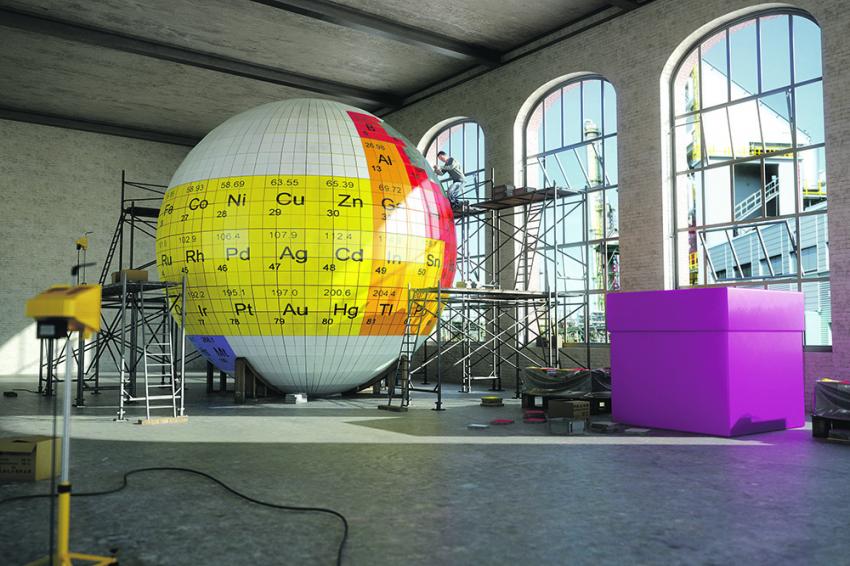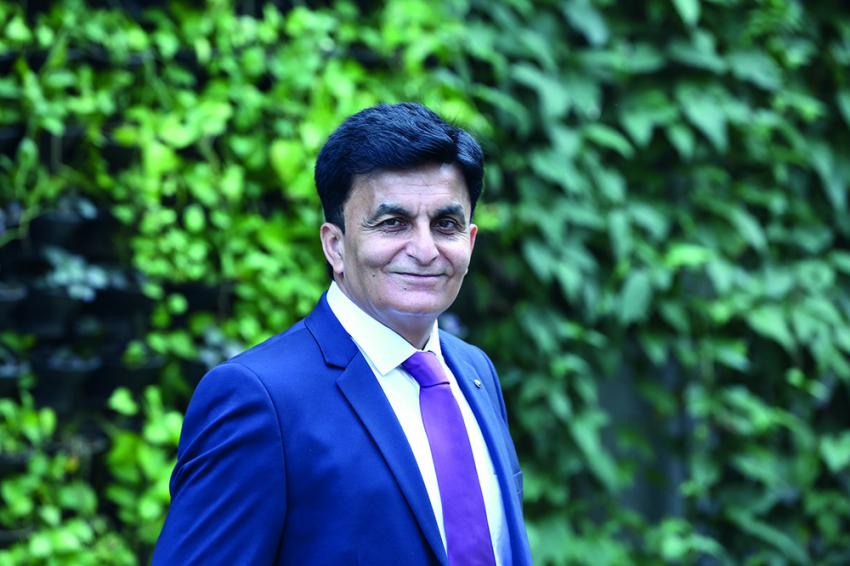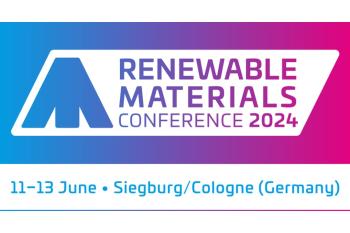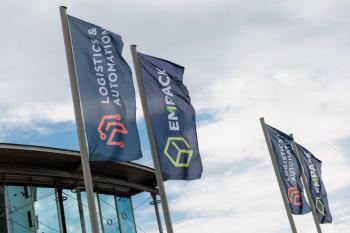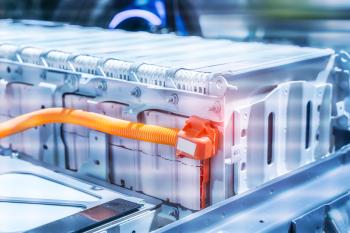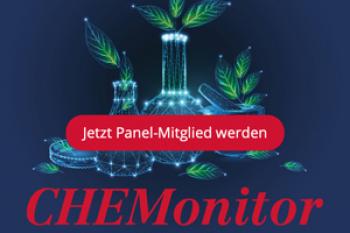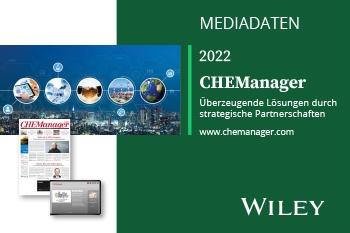Innovation is the Driver to Delivering Value
Catalysts Are at the Very Heart of Chemical Processes and Pioneers of Sustainability
Catalysts are a value generator in the chemical industry. By means of catalytic processes chemicals can be manufactured in higher yields, selectivity and with less energy input. Evonik, a leader in catalysis for more than 75 years, has expanded its catalysts business significantly in recent years. Following the acquisition of Indian producer Monarch in 2015, the German group in the fall of 2020 took over US manufacturer Porocel. Sanjeev Taneja, who assumed responsibility for Evonik’s Catalysts business line in July 2020, emphasizes the importance of catalysts for the company and the industry in general. A process engineer with an MBA degree, he began his career in 1987 at what was then Degussa and has held several positions at Evonik locations in Europe, the US and Asia since. Michael Reubold talked to him about the role of catalysts in the company and their value to the industry and the society.
CHEManager: Mr. Taneja, Evonik’s catalysts business is part of the company’s Smart Materials division. Without a doubt, catalysts are smart in many ways. How do your products embody “smartness”?
Sanjeev Taneja: The products Evonik develops and manufactures under the roof of this division are the smart answer to the major challenges of our time: environment and climate protection, urbanization, energy efficiency, clean mobility, and health care. I think where catalysts really represent the division well is how our products and solutions are continuously developed and adapted to the needs of the customers. This paves the way to greater resource efficiency and more sustainable technologies.
So, catalysts are catering to the mega trend of sustainability. Is this also the major market and growth driver for the catalysts business?
S. Taneja: Recently sustainability has certainly gotten a lot of attention, but for Catalysts, sustainability has been our focus from the get-go. Obviously, the whole strategic importance of catalysts is and has always been sustainability. They accelerate chemical syntheses or make them possible them in the first place, reduce raw material consumption, increase energy efficiency, reduce waste, just to name the most important benefits. Now, in the last few years, there is more talk about sustainability as a mega trend, and I am convinced catalysis will play an even bigger role in the future to enable circular economy and the decarbonization of the chemical industry’s value chains, especially if you think about biobased raw materials.
“I am very bullish about this industry!”
In addition to the sustainability topic, there are several other areas where catalysts can contribute, not only to the overall economy, but also to society: think about the development of active ingredients for pharmaceuticals or agrochemicals, where catalysts play a vital role. That is why I am very bullish about this industry.
Evonik is one of the few manufacturers of specialty chemicals that have a strong catalysts business in-house. What is the advantage of combining specialty chemistry and catalysis?
S. Taneja: Catalysis is a core technology for any specialty chemical company which is why I am very pleased that Evonik recognizes this fact. We have been on a sustainability journey for quite some time and, as we just discussed, a strong catalysis foundation is very beneficial to achieve this. Thus, the Catalysts business line is of strategic importance for Evonik.
The critical success factors of a specialty chemicals business and a catalysts business are aligned, for instance as both require innovation spending, focus on diverse applications and markets, profound project management skills and a very good knowledge of process technology. So, this synergy offers a mutual benefit, if you will. For both, a specialty chemicals business and a catalysts business, innovation is the driver to delivering value. This cannot be emphasized enough.
You said that the Catalysts business line is of strategic importance for Evonik. Is this why the business has been provided with quite some investments recently, for instance the acquisitions in India and the US?
S. Taneja: The companies we have bought are of strategic importance for us and an integral part of the overall growth story. The expectation from Evonik is for us to have an accelerated growth, and with that expectation comes responsibility and accountability. We will continue to seek attractive targets that make strategic and financial sense, obviously, in new markets and applications accessible for Catalysts. But one thing is clear, that any acquisition must support the sustainability and the circular economy trends. That is part of the criteria when we consider acquisitions. And obviously, that criterion was a big part of the Porocel acquisition in 2020. In addition, of course, it’s always good to add more complimentary competences, manufacturing capacities, and innovation capabilities.
What does the Porocel acquisition add to your business in terms of these criteria?
S. Taneja: It is a combination of everything. Porocel fits in very well with our sustainability approach bringing to the table a technology platform that contributes to the reduction of CO2 emissions. It is also an enhancement of our growth potential in relevant markets as Porocel brings the refining and petrochemical catalysts part, which further sharpens our portfolio with a focus on stable and high-margin specialty chemicals. Also, Porocel’s Excel rejuvenation technology is a significant step beyond standard catalyst regeneration. Last but not least, with the continuous process catalysts capacity additions, we are able to expand upon our custom catalyst offerings. So, this acquisition fits in very well with all three criteria.
Beyond providing us with a new technology platform and access to new markets, the acquisition is also quite meaningful in terms of our regional footprint because Porocel gives us access to their blue-chip customers in the US.
Evonik acquired Monarch five years ago. How has the Indian site and business developed since and what role does it play for your growth strategy?
S. Taneja: This has been a bolt-on acquisition, which also complemented our portfolio with Monarch’s oils & fats hydrogenation catalysts. The Indian site east of Mumbai is fully integrated and has been upgraded to Evonik standards. We produce three product groups at the site: precious metal catalysts, activated nickel catalysts, and as mentioned before oils & fats hydrogenation catalysts. The activated nickel catalysts and precious metal catalysts are mainly used in the pharmaceutical and agrochemical sector which are both very strong in India.
The site is an asset hub that caters to our growth in Asia. When looking specifically at the oils & fats hydrogenation catalysts the Southeast Asia market is particularly important, but also in the Americas because we have a big customer base for these catalysts there as well. In order to support this product group’s continued growth, in 2019 we enhanced our R&D facility at the site and in 2020 we inaugurated the pilot plant for these catalysts.
Also, during the last three years, we have strengthened the complete in-house precious metal catalysts loop there. So, the service offering to our customers is just tremendous, because we can cover the whole catalyst life cycle.
You already mentioned several catalyst brands and catalytic processes in various industries. What are your key branded catalysts?
S. Taneja: One of our key brands is called Noblyst which spans a range of catalysts that contain precious metals like platinum, palladium, rhodium or ruthenium on various support materials. They are used in fixed-bed applications or batch and continuous batch processes. In fact, we are the world market leader for the powder form of precious metal catalysts. Another brand called KALCAT™ is an activated nickel powder catalyst. Both the powder precious metals catalysts and Nickel-based catalysts are used in slurry processes with most of the applications being hydrogenation reactions. The third example is our Indian catalyst brand MONCAT™, an embedded activated nickel catalyst for the hydrogenation of oils and fats.
Another very important part of our portfolio is a catalyst system for the HPPO process, a process in which propylene oxide is obtained directly from hydrogen peroxide and propylene. This is enabled by a catalyst based on titanium silicalite, custom designed by Evonik especially for the process. We also hold a leading position here, especially in combination with Evonik’s role as a leading manufacturer of H2O2.
As mentioned before, with the Porocel acquisition we added the Excel hydro-processing catalyst rejuvenation technology to our portfolio. But furthermore, Porocel also brings UltraCAT to our portfolio, a technology that converts metal oxides to metal sulfides resulting in a fully preactivated catalyst. So, in a nutshell, those are our key brands.
In addition to your proprietary branded catalysts, you develop customized catalysts. Which role does this activity play in your portfolio compared to the branded catalysts segment?
S. Taneja: The customer specific catalysts segment is an integral part of our business model and one of the areas which we will continue to reinforce as well as continue to grow. It gives us the opportunity to jointly develop new processes with our customers, and it ties into our core strengths, which not many other companies can bring to the table for their customers. We leverage these core strengths in the context of a project, specializing in developing, scaling-up, and producing sophisticated catalysts on a commercial scale. Joint development with customers requires mutual trust, intimacy and very close collaboration, which applies more to strategic long-term relationships than just transactional ones. Although, our custom catalysts business is project based, the products produced are also marketed under a common brand name, Specialyst.
Are you able to leverage some kinds of synergies between the custom and branded catalysts businesses?
S. Taneja: Yes! For example, active metal catalysts and precious metal catalysts are very synergistic. Our approach, having this multi focused strategy enables us to leverage synergies pretty much across all product groups, for instance regarding competences and critical mass in research, development & innovation, scale-up, manufacturing, and the whole metal loop.
What is your innovation strategy?
S. Taneja: We are currently utilizing a lot of resources right now to enhance our research, development & innovation capabilities. Clearly, going forward, one part of our strategy is to establish centers of excellence, depending on the footprint across the globe, not only at our German sites in Hanau or Marl. For the oils & fats hydrogenation catalysts the center of excellence is in India. We have a good RD&I footprint in China already, but we must have some knowledge transferred to the Asia-Pacific North region.
Having worked in the US, Europe and Asia, do you think that Western chemical companies have a lead in terms of working in R&D partnerships? Is this a competitive advantage?
S. Taneja: I would not say it is a competitive advantage because no competitive advantage, as we all know, is everlasting. But at least the Western companies can use their footprint in Asia and elsewhere to get a head start. But believe me, I have seen this with my own eyes: the Asian companies are catching up very fast.
“No competitive advantage,
as we all know, is everlasting.”
Innovation is crucial when competing along the value chain. I truly believe Western companies need to concentrate even more on RD&I to not only compete but also to survive. Wherever the RD&I initially takes place, competency transfer to all regions needs to happen so we can always support local customers.

